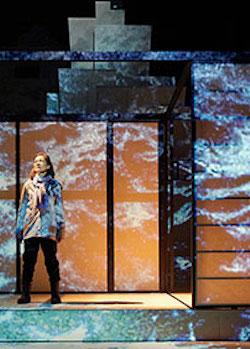The Great Wave

Directed by Indhu Rubasingham and written by Francis Turnly
A co-production with the Tricycle Theatre
Playing at the Dorfman Theatre (National Theatre)
Until 14 April 2018
Review by Poppy Cosyns
What at first appears to be a conventional family drama, soon develops into something of global significance in Japanese-Northern Irish playwright Francis Turnly’s latest work for the stage. The play begins with a jump-inducing thunder clap, before we find teenage sisters Reiko (Kae Alexander) and Hanako (Kirsty Rider) engaged in a typically adolescent squabble over their mutual friend, a boy named Tetsuo (Leo Wan). At this point older sister Reiko is shown to be a prim and condescending high-achiever, who deeply disapproves of her fashion-conscious and rebellious younger sister Hanako. The row escalates and eventually Hanako leaves the house – her feelings bruised – to meet Tetsuo at the beach, despite the storm that rages outside.
When Hanako fails to return, the action splits between two main settings: the family home in Japan, in which Reiko and the girls’ mother Etsuko (Rosalind Chao) work tirelessly to discover what has happened to her and a compound in North Korea, where, it transpires, she has been taken. The action flits between the two settings often, which makes the play surprisingly pacey, given its ambitious timeframe. The frequent transitions between the two sets have been deftly handled by designer Tom Piper’s rotating cube stage and clever use of projections.
The play is based on the true story of Japanese citizens abducted by the North Korean regime in the 1970s and ‘80s and most closely echoes the experience of Megumi Yokota, who was just 13 when she went missing. Despite the North Korean government’s repeated assertions that Megumi had died, her parents – much like Etsuko and Reiko – believe that their daughter is still alive and continue to publically campaign for her return. The fates of the 17 confirmed abductees were the source of widespread public outcry throughout the 1980s and ‘90s and remain a contentious issue to this day.
Kae Alexander’s frantic performance as Hanako’s guilt-ridden sister is particularly strong, as she is continually stymied by an indifferent and bureaucratic system. Her anguish is palpable as she confronts a government official with the desperation of her family’s circumstances and the audience finds itself sharing in her feelings of frustration and injustice. As the years go by, Reiko becomes consumed by her sister’s disappearance, and fails to fulfil the potential she demonstrated so clearly at the start of the play, only adding to its overall sense of tragedy.
Hanako’s indoctrination is brilliantly written, her resignation to the hopelessness of her situation a gradual and emotionally-fraught process. We see her transform from a sassy and temperamental teenager into a solemn and browbeaten woman, seemingly loyal to the government that holds her captive. The two North Korean characters, in contrast, are generally represented as cartoonish puppets of the regime, as opposed to fully rounded characters. Towards the end of the play we are given some glimpses into their inner lives, but more could have been done to show that they too are victims of the regime.
While not without its shortcomings, this is a tight and well-structured production, particularly considering that it spans a period of 24 years. The small cast put in sensitive performances and the three female leads manage to propel the story forward with impressive verve and momentum. Despite the politically charged subject matter, Turnly has ensured that the human relationships remain at the heart of the drama throughout.

